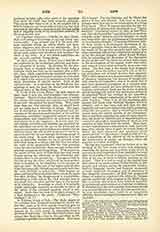

Lieberman, BRUNO FRANZ LEOPOLD, Catholic theologian, b., at Molsheim in Alsace October 12, 1759; d. at Strasburg, November 11, 1844. Having finished his humanities in the college at Molsheim, he studied theology from 1776 to 1780 in the seminary at Strasburg, after which, as he was too young for ordination, he was as subdeacon appointed teacher in the college at Molsheim. He became a deacon and a licentiate of theology in 1782, and was ordained priest on June 14, 1783. He shortly afterwards became professor in the Strasburg seminary, in 1784 preacher at the cathedral, and in 1787 pastor at Ernolsheim near Molsheim. During the Revolution he was obliged to take refuge across the Rhine (1792), and the Bishop of Strasburg, Cardinal Rohan, appointed him rector of the seminary which had been transferred for the time to the Abbey of All Saints, in the Black Forest. Here he taught dogmatic theology and canon law, and wrote his unpublished “Institutions iuris canonici universalis”. In 1795 he secretly returned to his parish at Ernolsheim, where he labored in secret and in great danger for the cure of souls until 1801, holding at the same time the office of extraordinary episcopal commissary for this division of the diocese. In 1801 he was called to Strasburg as preacher at the cathedral and secretary of the diocese, but returned once more to Ernolsheim in 1803. On March 12, 1804, he was there unexpectedly arrested, and, on the groundless suspicion that he was in secret communication with the royal family, was held a prisoner in Paris for eight months. When, through the intercession of Bishop Colmar of Mainz with Napoleon, he regained his freedom, he was called by this bishop to Mainz in 1805 as rector of the newly founded seminary there, and in 1806 became also a member of the cathedral chapter. In the seminary he lectured on canon law, church history, pastoral theology, and, after 1812, also on dogmatic theology.
Personally and through the clergy trained by him, Liebermann exerted a wholesome and long-continued influence upon the revival of the ecclesiastical spirit in Mainz and the adjoining dioceses. Among his pupils were the future bishops Rass, Weis, Geissel, and such other distinguished men as Klee, Luft, Lennig, Remling, and Nickel. After he had declined in 1823 the appointment to the See of Metz, Bishop Tharin summoned him as his vicar-general to Strasburg, where he continued his fruitful activity. Under Tharin’s successor, Bishop Lepappe de Trevern, he withdrew more from public life. His last years were spent in retirement in the motherhouse of the Sisters of Charity. Liebermann’s name will live in theological literature through his well-known “Institutiones theologicae”, first published in five vols. (Mainz, 1819-27; 6th ed., 1844) and later in two (10th ed., Mainz, 1870). Owing to the correctness of its contents and its clear and well-ordered style, this work was used as a textbook for years in many theological seminaries in Germany, France, Belgium, and America. During the time of the Revolution, Liebermann published several anonymous pamphlets in defense of the rights of the Church and against the required oath of the civil constitution of the clergy. Of his sermons several have been published separately, e.g. “Lob-und Trauerrede bei Gelegenheit des Hintrittes des hochwurdigsten Herrn Joseph Ludwig Colmar, Bischof zu Mainz” (Mainz, 1818). After his death appeared:—”Liebermann’s Predigten, herausgegeben von Freunden and Verehrern des Verewigten” (3 vols., Mainz, 1851-3). From 1825 to 1826 he was editor of the “Katholik”.
FRIEDRICH LAUCHERT

